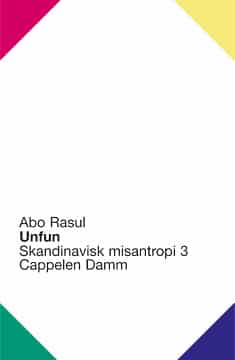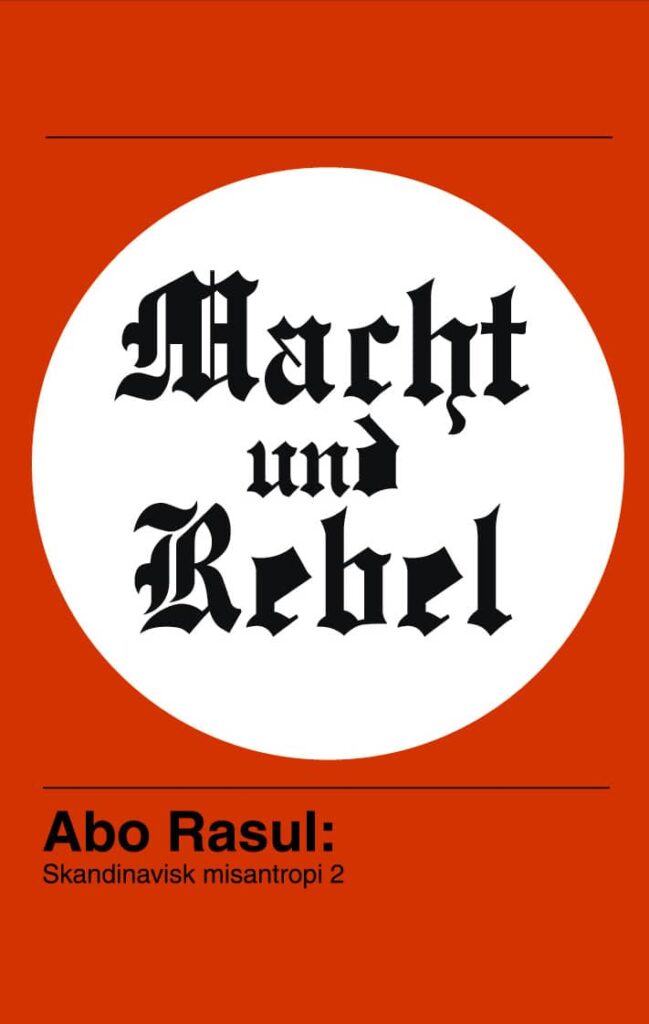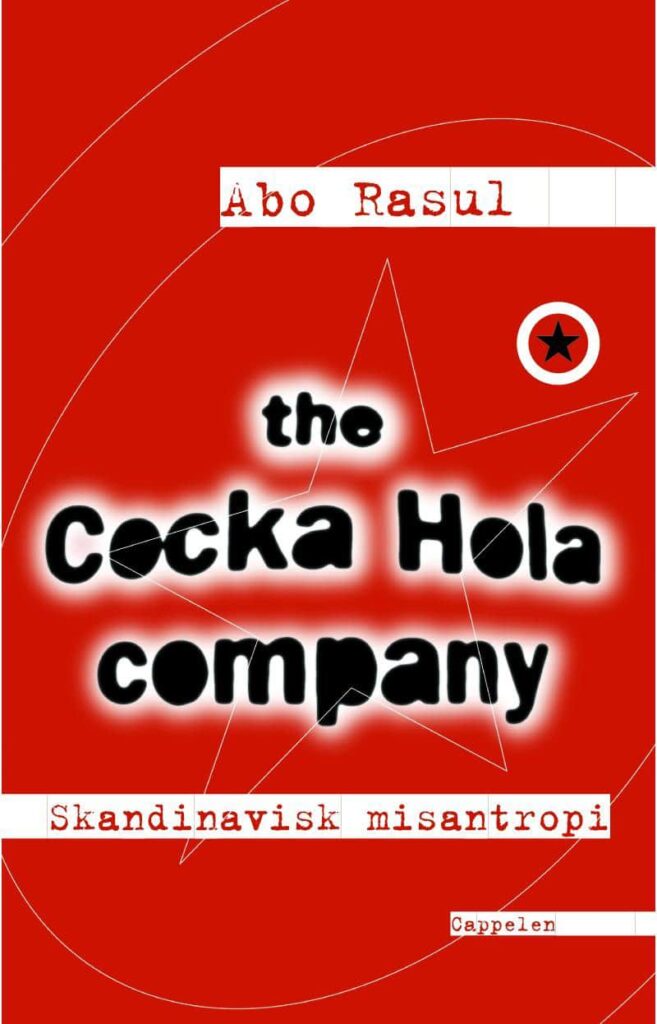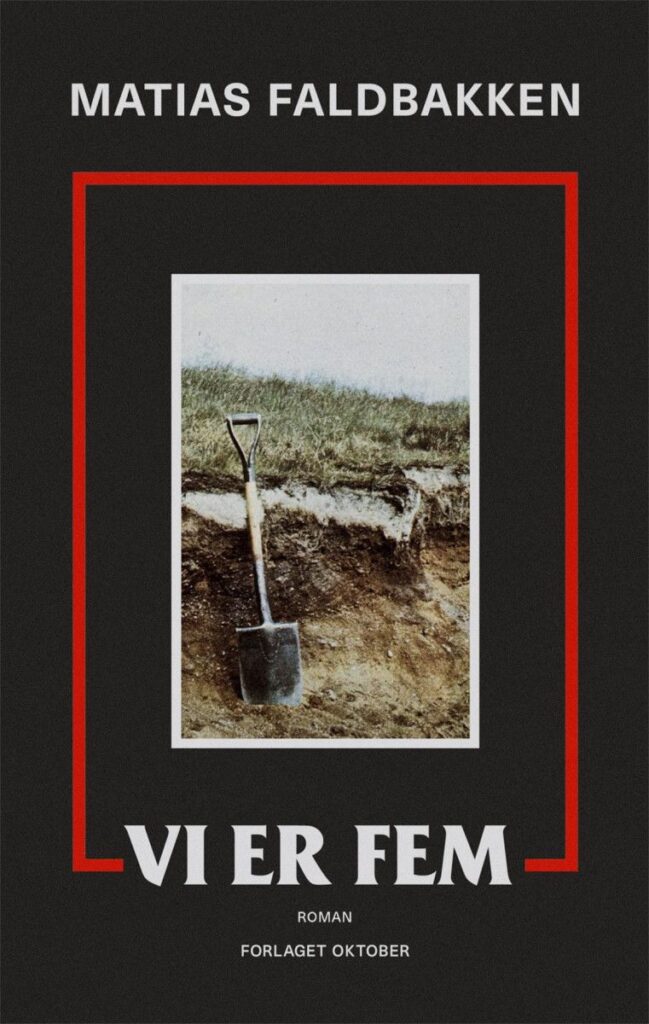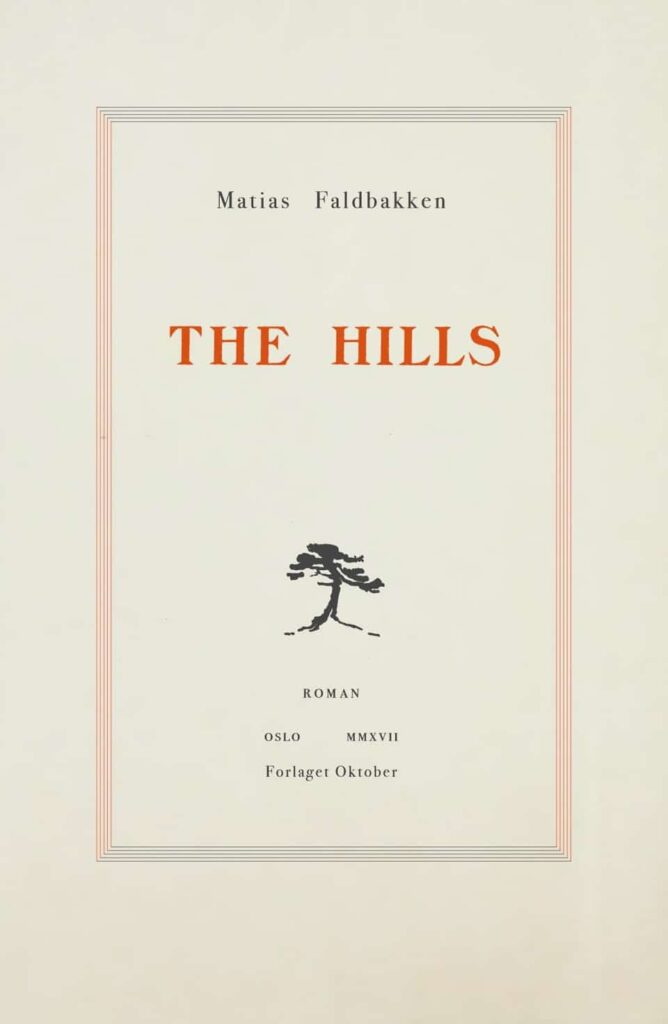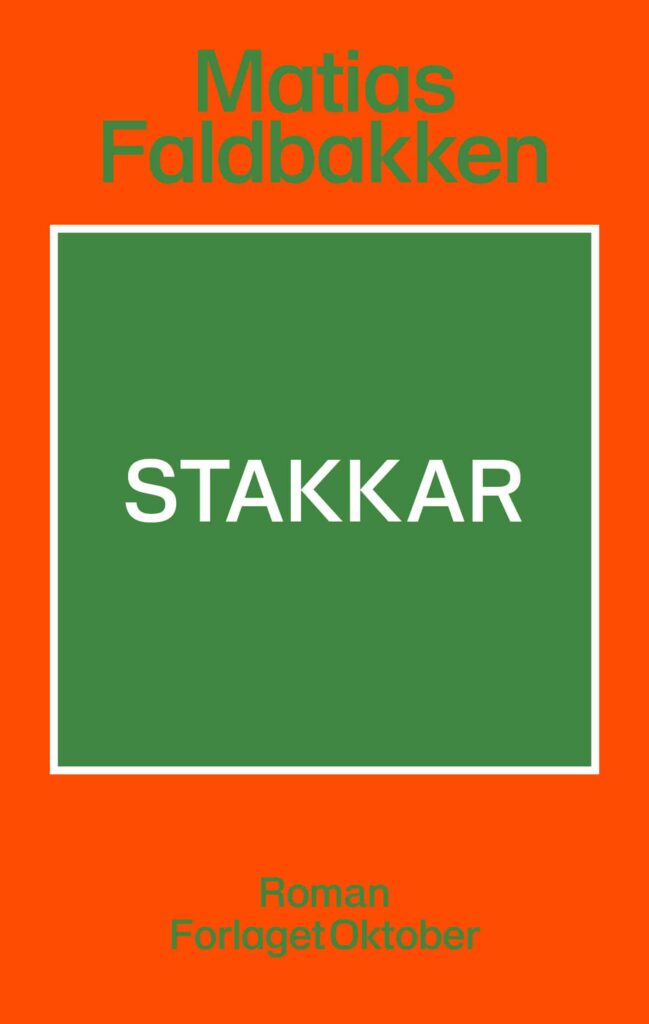
Stakkar Poor Thing
Once upon a time, not that long ago, a child came crawling out of the woods, poor thing. Climbing out from the ditch, it began to wander the graveled road. It was a sad sight to behold.
The child was scruffy and ugly. Its hair was tangled. The forehead contorted. A frightened look could be seen on its face, eyes darting above crusty nostrils. The lips were stiff and blue and the neck far too thin. A long cloth or tattered vest wrapped around its torso, and under it two skinny legs protruded, knees wider than both calves and thighs. The child wore no shoes. Its oversized feet resembled wet wool socks. From time to time, the knuckles of one hand would scrape the ground. And close to its ribs, the thin, hunched figure clutched a tattered folder, or perhaps an envelope, like an animal come out of the forest bearing a message.
The lonely foster boy Oskar works at Aud and Olav Blum’s mill for board and lodging. One day he discovers a child in the forest, an untamed cub, whom he captures and takes home. The child suffers from stunted growth and is almost completely mute, but under Oskar’s care, it begins to grow at breakneck speed.
Matias Faldbakken’s sixth novel, Poor Thing, is both a love fable and a coming-of-age story. It is written with great imagination, linguistic abundance, and a distinctive mixture of passion and irony. The narrative alternates freely between realistic novel traditions, satire, romance, and folk tales, and several historical eras are in flux at the same time.
Poor Thing is an original, entertaining, and captivating novel about exclusion, loneliness, desire, and care. And all the while, the story poses the question: What is a trauma?
Awards
| Shortlisted for the Norwegian Critics' Prize for Literature Norway | 2023 |
| Shortlisted for the Norwegian Booksellers’ Prize Norway | 2022 |
| Shortlisted for the Brage Prize Norway | 2022 |
Reviews
-
“Faldbakken’s [Poor Thing] is a smart variation of Kaspar Hauser’s story. /…/ In the brilliantly challenging closing section, the themes that [Faldbakken] has playfully discussed throughout the novel are condensed in a shockingly serious way (…). Matias Faldbakken has created a fascinating work of art in this novel, like something straight out of Frankenstein’s and Pygmalion’s workshops, a potion of spooky romanticism and fairy tales, mixed with a large dose of irony and wordplay, which glitters convincingly in Max Stadler’s translation.”
-
“The most eccentric novel of the year. A wonderful and crazy story about a love affair between two lost people /…/ it is tragic, it is exciting, but it is also very entertaining for a reader who enjoys a hopeless and beautiful love affair /…/ Wildly original, it is raw realism and an adventure about exclusion with people you certainly don’t have in your social circle. No one writes like Faldbakken.”
-
“This is probably the most baroque and at the same time grimly realistic thing you will come across in this year’s book harvest! /…/ Gradually, Poor Thing transforms into a coming-of-age story, interspersed with solid doses of poking fun, which has Oskar and the Poor Thing on the run to the big city of Oslo. Along the way, they have to go through forests and over mountains, and these descriptions of nature are some of the best I can remember reading in a very long time. /…/ One of the best things about reading Matias Faldbakken is that you have no idea which direction the story will take. You just know it’s going to be good. Very good. /…/ We are talking about a primitivist and largely inarticulate flood of words, almost an archaic, exhorting poem. This text stretches all the way to the limits of what can be explained and is at the same time one of the strongest things I have read in modern Norwegian fiction. If you are ready for the autumn’s most exciting and unique reading experience by far, all you have to do is throw yourself over Poor Thing. ”
-
“Matias Faldbakken can make anyone fall in love with literature anew /…/ It’s difficult to precisely articulate where Matias Faldbakken’s mastery lies, why he is the one of Norway’s most formidable contemporary writers that I am truly eager to hear new things from, but it’s primarily about originality /…/ One is left deeply affected. Has this great novel really only filled 180 pages?”
-
“In a class of its own /…/ [Matias Faldbakken is] one of the greatest authors of the Nordic /…/ A both beautiful and peculiar reading experience, where the expectations that the reader might have for a Nordic novel are consistently dissolved and undermined. And a thousand thanks for that.”
-
“Few are as original and surprising as [Matias Faldbakken]”
-
“Matias Faldbakken delivers yet another fantastic story and solidifies his name as one of the most interesting Scandinavian writers right now. The Norwegian darling of critics writes sharply, distinctively, lovingly, coldly, and momentarily hopefully about vulnerability /…/ a tough, beautiful, and quirky novel about care in the dark. About all that is misshapen, which also carries vitality and potential within it.”
-
“Faldbakken’s greatness lies in the way he manages to adjoin this tenderness on a purely linguistical level into the novel’s narrator. He weaves it together with an ironic tone and by paraphrases, digressions, and repetitions manages to create a language where every sentence is more surprising than the previous one. /…/ Nothing in this novel should work; how many books with a strong and particular language have not caused ileus because the characteristic language has been too “quote like” or a superfluous ornamentation? Yet here it works in a magical way. Matias Faldbakken has written a novel which I am convinced would not be written in Sweden.”
-
“With [Poor Thing], Matias Faldbakken once again proves himself to be a skilled storyteller who knows how to construct an exciting story based on a simple premise where the characters seem to undergo their fate without further ado. /…/ Even if Oskar in all likelihood is the title’s intended poor thing, it’s not hard to imagine that each and every one of the other characters can fit that description. Poor Thing is not purely a naturalistic novel – the story is too lighthearted and subtly humoristic for that. Faldbakken uses his characteristic ironic distance, which remarkably enough adds to the story rather than undermining it.”
-
“In a modern fairy tale, Faldbakken transports remarkable characters from village to city, but it is the linguistic antics which carry the novel /…/ Both in village and city, the novel becomes an illustration of how little room we have for those who do not fit in /…/ What charms me most is the playful and crass language which surprises both in terms of wording and focus. Faldbakken’s background in the field of visual art is apparent in the enthusiastic attention to the tactility of the village, and there is something liberating in how much space is devoted to materials and construction methods.”
-
“Faldbakken mesmerizes. Matias Faldbakken’s [Poor Thing] is compellingly told with stylistic devices fetched from folk tales. /…/ Faldbakken uses a language that is so visual and stylistically precise that you find yourself enjoying each and every sentence. A narrative that’s traditionally oral in style, like in folk tales, alternates with biting irony in the depiction of modern urbanity and money culture. Here we find both simple Cinderellas and various emperors in new clothes. /…/ Matias Faldbakken has struck a fairy-tale tone that brings paintings by Kittelsen and Werenskjold to mind. /…/ Faldbakken’s depictions of nature in this sequence are thrillingly beautiful. /…/ We shall not reveal the ending here, because no one lives happily ever after in Matias Faldbakken’s universe. But it has been a joy to follow along on the journey. ”
-
“A big, little fable about love, about the cultivation urge of the big city, about the loss of innocence and the unsullied. In a time when everyone writes about the immediate, we should be happy to have Faldbakken, who stands refreshingly alone, so far from contemporary literature.”
-
“Faldbakken has brewed together a witch’s potion of a novel /…/ The text plays with both clichés and tropes – and gives us the beautiful and the painful in a powerful mixture, ironic and straight forward all at once. /…/ With such a language and intensive drive, the author has created a particularly entertaining quest”
-
“Matias Faldbakken’s writing is edged, funny, clever, cool, raw, original, burlesque, anti-urban. And beautiful. /…/ Poor Thing is a peculiar novel that takes a firm hold on the reader. /…/ It feels good to read a novel that draws such power from imagination, language, and cultural heritage. Poor Thing is a cunning adventure-mix with hints and winks to history, literature, and science. With brightly colored images, almost like ornamentation, the story glides forward.”
-
“I have hardly read a novel anything like this one before. Stories about “wild children”, sure. Stories about alienation and loneliness, odd people’s peculiar communities and the power of love: many. Matias Faldbakken’s story is still in its own league. His narrative style can be described as filled with breaches. It roams freely between timeless and modern, often abruptly. To not anchor the story in a set time, and still manage to make it believably concrete is not the simplest thing for a writer. Faldbakken succeeds. He makes Poor Thing a fruitful hybrid between fable and Bildungsroman, where he depicts both human vulnerability and her strength. /…/Matias Faldbakken writes with joy, humor, and tragedy. [Poor Thing] has a powerful energy, it’s exciting like a thriller, and the language is sometimes hypnotic (…) enchantingly poetic, at the same time brutal. This is a saga you almost believe to be true.”
-
“Poor Thing is an original and well-told story, with plenty of suspense and a plot that is impossible to predict. /…/ Matias Faldbakken has a wide register, where irony, satire and exaggerations often create a distance from the characters. When the girl throws herself before us with limping syntax and poetic desperation, a new trait emerges: One that’s downright touching. /…/ Poor Thing is completely unique, and the sense of alienation is of a completely different character. This is a captivating fable about growing up in nature and about colliding with culture. The enigmatic story plays on many strings and is open for interpretation. That’s one of the fascinating aspects of Faldbakken’s novels: they never seem to end.”
-
“Matias Faldbakken is what I frenetically look for in all contemporary literature, but so seldom find: an author who follows his own path – not to appear special, but because his path is the only one imaginable. /…/ [Faldbakken’s] paintings have a matter-of-fact stance about them, he explores shapes and lets the observer speculate about the contents. At first glance, his literary works can seem to bear traces of those same elements, but that is a misunderstanding. Poor Thing (…) evokes feelings within me that I haven’t gotten from a book since Agota Kristof’s The Notebook, which depicts misery and tenderness with the same direct, distinct voice. /…/ Here, one can choose which way to read [Poor Thing] – whether it be as an allegory, fairytale, a style experiment. The important thing is, nevertheless, how Faldbakken uses language (…). This is the way to beat one’s readers into consciousness, if you want them to feel. No sentimentality. No traces of writers’ workshop manipulation. No neglect. Faldbakken has positioned himself in a linguistically motley landscape with a nearly biblical tone at times, mixed with the occasional contemporary throws. It is inconsistent and unreasonable, as is life. Like Agota Kristof, Mare Kandre, Torgny Lindgren, [Faldbakken] wields his linguistic whip where it hurts the most. No more, no less. He forms a landscape, tangible as well as emotive, where you can cut yourself on the beauty, and where one who has never experienced love can still give to another. If [Poor Thing] teaches us anything, it’s that we might need to get all the way down to the nastiest bottom of the world’s pile of garbage to reexperience mercy and reliance. /…/ There is no doubt, regardless of debates about the death of the book and stupid authors. Great literature is still alive. Very much so in Norway.”
-
“A luminously dark tale. Matias Faldbakken has delivered the most original novel of this autumn. Poor Thing has to be one of the best, most creative, shocking and moving stories this author has written. Perhaps he has used a sledgehammer and not an ordinary keyboard to carve out his characters. They both resemble and don’t resemble ordinary people. They have been given a supplement that makes them more vulnerable, more furious, more pitiful, but also more brilliant and adventurous than the pale fictional characters that we are normally presented with. In its form, Poor Thing resembles a fable, a fairy tale or something Hamsun-ish perhaps – a story ‘seen through a vortex in the pane’. /…/ He is linguistically cheeky and bold also in this autumn’s novel, entertainingly satirical with a lot of discomfort during the sometimes dazzling linguistic phrasings. But it is the unforgettable characters, and especially the young boy Oskar and the creature from the forest, that make this novel vibrate. /…/ Exaggerations, caricature, irony, and razor-sharp observations fight for space in this story, which throughout has a tender and loving gaze set on the two aforementioned heroes of the novel. They are surrounded by a gallery of people who are partly drawn up like caricatures, but they still seem very alive and multidimensional. /…/ Poor Thing is a brilliant story. This is Matias Faldbakken in high gear.”
-
“Matias Faldbakken is a literary infiltrator of high class. /…/ Faldbakken is one of the most interesting authors in the Nordic countries. /…/ Like many great authors today he operates on the border between fantasy and realism, when a monstruous present cannot be detained within a single genre. /…/ One could contrast [Faldbakken] with Michel Houellebecq, who takes today’s political traumas and forms them into art. Faldbakken does the opposite: he finds fairytales in the scrapheap of history and lets them collapse into the present age. /…/ Faldbakken is funny! [Poor Thing] can be read on many levels. /…/ These detailed scenes constitute a break in the otherwise quick tempo, which gives a psychological indication: the chaotic and non-coherent subject forms a self by internalizing an outer image of themselves. That way of reading gives [Poor Thing] an unexpected depth, as if [Faldbakken] has taken influence from Jacques Lacan. But it is also possible to read those same scenes as a criticism of civilization, like a modern version of Frankenstein, where our civilization is put to the test when an unharmed being grows into it. Poor Thing depicts a human being trained into modern society, which in the end is dismissed as Utskilde returns to the wilderness. Yet, these interpretations do not capture the width of Faldbakken’s literary qualities. His prose has a sort of lucidity, a clear view – whilst at the same time being genuinely unpredictable. /…/ [Faldbakken] introduces two levels in the story, one mythical, and one where he tells us that this nothing but a fairytale. The strange thing is that he depicts both with the same credibility and seriousness – they never outmaneuver each other. When it comes down to it, Falbakken is a realist, but his prose marches steadfastly into a magical fog. /…/ Poor Thing is of course not a patriarchal story (…), but a post-patriarchal novel that has swallowed both the misogynistic bildungsroman and the feministic criticism of the same, vomited it all up, and fascinatedly plays with the guck. With [Poor Thing], Faldbakken establishes himself as a literary infiltrator who continuously fucks up the evolutionary story that we tell ourselves.”
-
“Faldbakken turns to myths, medicine, law and literature to create a multitude of themes that reveal both a fear of and fascination with difference. /…/ With great success, he creates a linguistic free space for himself where he can mix styles. /…/ The novel takes the side of the weak and liberates the girl from both physical and mental limitations. Along the way, Faldbakken composes a beautiful love story. /…/ Delightful.”
-
“The exquisitely executed, ominous insecurity that Faldbakken sows, with diction as antagonist, makes an instant impact on its reader. The rural setting with its Scandinavian pastoral that is evoked in [Poor Thing’s] initial theme is torpedoed by modernistic, ironic elements which work as jolts toward the story’s audience. /…/ The depiction of different kinds of alienations is perpetual in Poor Thing. /…/ [On some occasions] I get the feeling that there is no plan. [Faldbakken] continues writing until it feels right to stop, tires himself with intrigue. Goes with the flow. Follows his notions. And that is all well and good, but it means that maybe we shouldn’t trust habitual things like the writer’s agenda, the novel’s message, and so on. Poor Thing is ultimately a realistic novel. Nothing in the story is unreasonable or surreal. /…/ In spite of that, a feeling of delusion is very much present, as if everything is a bit deranged in a way that pulls toward the expressionistic.”
-
“The unfamiliar prose- and genre combinations make Matias Faldbakken’s new novel both fun and full of joy. /…/ In [Poor Thing], an unknown, almost monstrous entity enters the scene to shake an otherwise orderly world. But here, Faldbakken takes it further, and treads with slightly less light-footed steps. /…/ In [Poor Thing], the theme of care, which has previously been more underlying, gets a clearer direction. Poor Thing stands with the outsiders.”
-
“Matias Faldbakken has written a modernized version of George Bernard Shaw’s Pygmalion (…), but with a more macabre ending. (…) [Poor Thing] is refreshing and engaging, to put it simply: really good. This thanks to Faldbakken’s scarce and somewhat monotonous tone which works very well, and is well reflected in the translation. Faldbakken (…) is starting to become one of the most influential and important Norwegian writers of today.”
-
“Magnificent and unpredictable. /…/ With his new novel Poor Thing, Matias Faldbakken lives up to the high expectations. /…/ Faldbakken does not shy away from writing about the big questions. [Poor Thing] deals, among other things, with trauma and the limits of normality, all in a precise and unique form of prose.”
-
“A mischievous and fantastic fable /…/ Poor Thing is the kind of story where the characters and figures remain the same throughout, but their significance changes from chapter to chapter. As mentioned, it could feel sterile, like an exercise in style. But here, it feels more ingenious, thought-provoking, inciting, touching, sad, silly, uncomfortable, and beautiful. That’s the fantastic thing about a book that constantly transcends itself: It ends up taking its reader to an unknown place.”
-
“Twisted things are happening in our neighboring country Norway. (…) Poor Thing is the weirdest thing I have ever read. I don’t want to spoil it any more than I have, but: imagine [the movie] Poor Things, if Poor Things did not suck. Someone must open up Faldbakken’s head and with high-tech equipment examine what is going on in there.”
- Author
-
 Matias Faldbakken
Matias Faldbakken
- Published
- 2022
- Genre
-
- Literary
- Pages
- 184
- Reading material
Norwegian edition
English translation
- Rights sold
-
Arab World, Al Arabi
Denmark, Gutkind
Faroe Islands, Sprotin
Germany, Btb
Italy, Mondadori
Netherlands, Uitgeverij Oevers
Norway, Oktober
Sweden, Albert Bonniers
Türkiye, Timas
